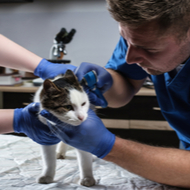RCVS meeting to discuss future of Extra-Mural Studies

"This stakeholder meeting will bring all those in the sector together to discuss new ideas around longer-term plans for EMS" - Dr Linda Prescott-Clements.
The RCVS has announced that it is to host a stakeholder meeting to discuss the future of Extra-Mural Studies (EMS).
EMS is viewed as important to undergraduate veterinary education, with both pre-clinical and clinical placements providing students with real-world work experience.
The meeting comes in response to the RCVS Graduate Outcomes Project, which unveiled various challenges facing students, veterinary schools and placement providers in being able to offer and implement EMS placements.
More than 80 representatives from student groups, vet schools, employers, placement providers, veterinary representative organisations and new graduates have been invited to participate in the meeting, which takes place on Monday, 22 November at the Royal College of Surgeons.
Dr Linda Prescott-Clements, RCVS director of education, commented: “The veterinary education landscape is changing – both as a result of Covid but also increasing student numbers, new vet schools being established and an increasing emphasis on clinical teaching in a first-opinion, general practice context.
"These factors are all likely to increase pressure on the current system with the potential for increasing demand for EMS coinciding with reduced availability. For this reason, we are starting to look further ahead into the future of EMS so that we can be prepared for all eventualities."
She added: “This stakeholder meeting will bring all those in the sector together to discuss new ideas around longer-term plans for EMS so that we can continue to support future students in obtaining this vital experience in the workplace before they graduate.”



 The Veterinary Medicines Directorate (VMD) is inviting applications from veterinary students to attend a one-week extramural studies (EMS) placement in July 2026.
The Veterinary Medicines Directorate (VMD) is inviting applications from veterinary students to attend a one-week extramural studies (EMS) placement in July 2026.